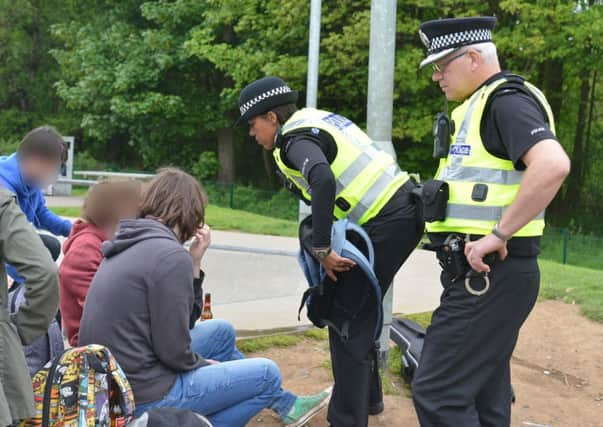Call for reform of ‘failing’ Police Scotland


Police Scotland has recently been heavily criticised over high levels of stop and search and the arming of officers and now the merged force is facing calls for a dramatic overhaul that would see crimes investigated at national and local levels.
As Scotland’s most senior officer, Sir Stephen has been engulfed in controversy over the way the new force is run, with many critics believing that there are not enough checks and balances in place to hold him and the force to account.
Advertisement
Hide AdAdvertisement
Hide AdAddressing the Convention of Scottish Local Authorities (Cosla) annual conference, Conservative MSP Murdo Fraser put forward a model that would see serious crimes dealt with by a national police force and community crimes handled by 32 local forces sharing boundaries with Scotland’s 32 local authorities.
At the conference in Crieff yesterday, Mr Fraser said the current system under Police Scotland was “failing”.
He said: “Instead of enhanced accountability and scrutiny, what we have seen is a sorry saga of centralising authority, of a loss of community policing, of closures of public counters.
“Add to that the fiasco over stop-and-search, the row over routinely armed police officers, and the seemingly utter inability of the police authority to hold the chief constable to account, and it is clear that all is not well when it comes to the accountability of what should be a publicly responsive police service.”
Mr Fraser said the Conservative-proposed policing review would look at improving local accountability, but he acknowledged there “might be little appetite” for going back to the old structure of regional boards.
He said: “We think this proposed system could work very well, like it has in other European countries such as Belgium, the Netherlands and Spain.
“Already local councils employ community wardens to deal with local crime, and there’s no reason in principle why the administration of community police forces cannot also fall under the same local authority umbrella.”
The controversies following the creation of Police Scotland have led to questions about the ability of the Scottish Police Authority to hold the force to account.
Advertisement
Hide AdAdvertisement
Hide AdLast month, Sir Stephen was called in front of Holyrood’s justice sub-committee following concern about the high number of under 12s stopped and searched by the police.
The controversy over stop and search escalated when figures released last month suggested that hundreds of so-called consensual stop and searches had taken place on juveniles despite Police Scotland saying it had ceased to carry them out some six months before.
Meanwhile, it was revealed that armed officers have responded to more than 1,600 incidents since assurances were given that the practice would stop.
At Holyrood it emerged that armed response vehicles had gone to 1,644 incidents since October, despite a pledge being made back then that Police Scotland would only send gun-carrying officers to incidents where there was a threat to life. The incidents which armed officers attended included missing person searches and dangerous driving.
Despite the widespread concern about police accountability, Calum Steele, general secretary of the Scottish Police Federation, said he did not think Mr Fraser’s approach was necessary.
“We must be approaching a general election, because politicians are trying to make names for themselves,” Mr Steele said.
“Local accountability within the police service has not worked as well as it could, but that does not mean the problems cannot be rectified.”
First Minister Nicola Sturgeon defended the current system when she also spoke at the conference.
Advertisement
Hide AdAdvertisement
Hide AdMs Sturgeon said: “There are more local councillors involved in the governance of Police Scotland now under the single service than was the case under the old eight separate forces.
“Police Scotland was put together as an amalgamated force for very well-known reasons, to make sure that as we were maximising the resources going to front-line policing and minimising the resources that were taken up by having eight chief constables and all of the associated bureaucracy that goes with that.
“It’s partly because we’ve amalgamated the eight police forces into Police Scotland that we’re able to maintain 1,000 extra police on the streets.”
She added: “I would be reluctant to see us do anything that starts to build the back-room costs.”
For Police Scotland, Deputy Chief Constable Rose Fitzpatrick said: “The creation of a single policing service has resulted in greater scrutiny and more accountability than ever before – at a local level with more than twice as many local councillors now involved in the scrutiny of policing than under previous arrangements.
“The way policing is now delivered puts local communities’ concerns at the heart of our policing priorities. National specialist units support our local policing teams to ensure equal access to specialist resources whenever and wherever the need.”
A Scottish Government spokesman said: “The introduction of Police Scotland has strengthened accountability and local policing. Reform of Police Scotland has allowed us to protect frontline policing with over 1,000 additional officers out protecting the public and keeping communities safe. This is in stark contrast to the situation in England and Wales where officer numbers have continued to fall for the last 12 years.”
FOLLOW US
SCOTSMAN TABLET AND MOBILE APPS